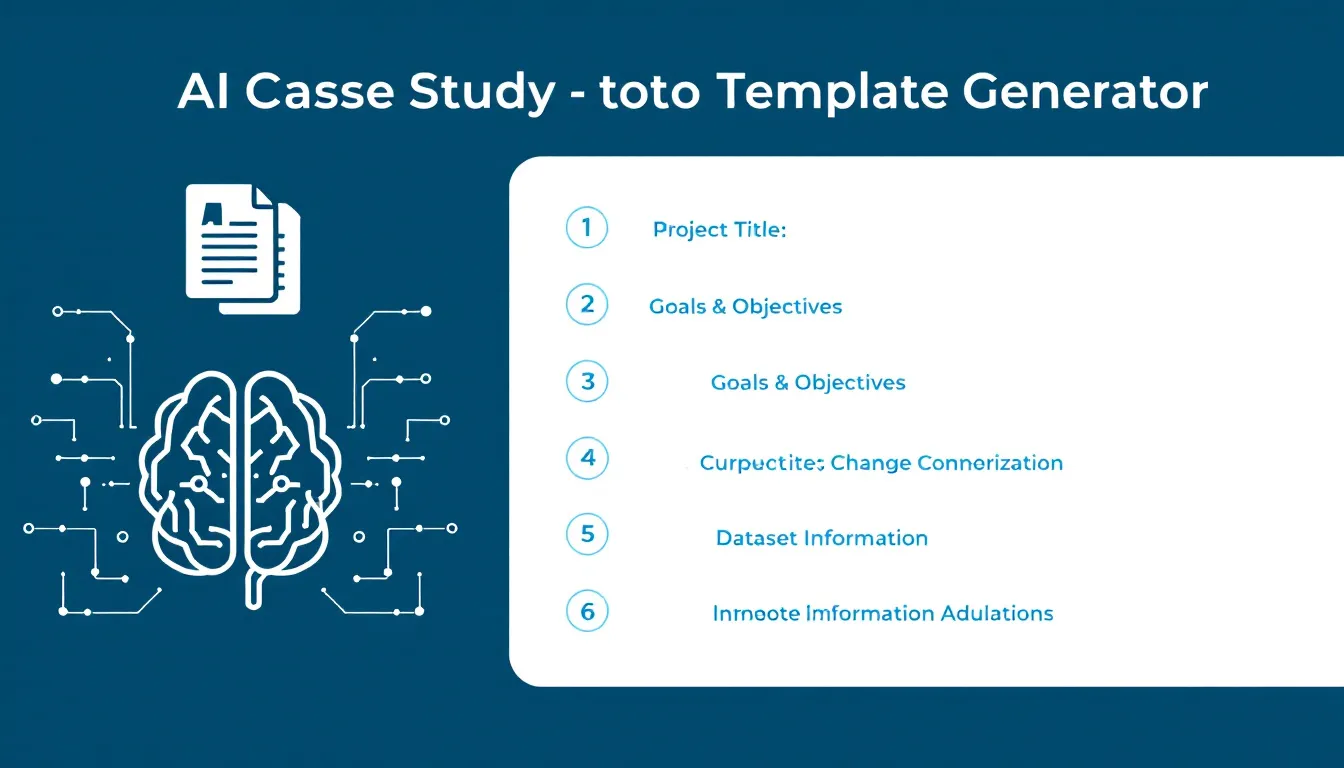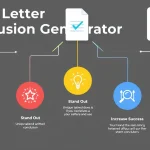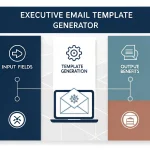AI Case Study Template Generator
Is this tool helpful?
How to Use the AI Case Study Template Generator Effectively
Step-by-Step Guide to Filling Out the Template
-
Enter the AI Project Title
- Provide a clear, specific title that reflects your AI project’s focus.
- Example 1: “Predictive Maintenance for Manufacturing Equipment Using IoT Data”
- Example 2: “Customer Churn Prediction Model for Telecommunications”
-
Define Project Goals and Objectives
- Explain the primary purpose and targets of your project.
- Example 1: “To build a real-time predictive system to reduce equipment downtime by 25%”
- Example 2: “To develop an accurate churn prediction model achieving >85% recall for targeted retention”
-
Provide Detailed Dataset Information
- Describe dataset size, features, origin, and any preprocessing steps.
- Example 1: “50,000 sensor readings from factory machines collected over six months with 10 key variables”
- Example 2: “Customer usage records from telecom provider for 1 million users, cleaned and balanced”
-
Describe Model Architecture
- Summarize your AI model’s design including layers, algorithms, and configurations.
- Example 1: “LSTM network with 3 hidden layers and dropout regularization for sequence prediction”
- Example 2: “Gradient Boosting Machine with 100 trees and learning rate of 0.1”
-
Input Evaluation Metrics (Optional)
- List the key metrics used to assess your model’s effectiveness.
- Common examples: accuracy, precision, recall, F1-score, AUC-ROC.
-
Document Results (Optional)
- Summarize your model’s outcomes, both quantitative and qualitative.
- Include improvements, performance on test sets, or benchmarking results.
-
Write a Conclusion (Optional)
- Provide a concise summary of your project’s impact and insights.
- Highlight how the AI solution addresses the problem and any future directions.
Introducing the AI Case Study Template Generator
The AI Case Study Template Generator streamlines your documentation of AI research and development projects. Designed for researchers, engineers, and data scientists, this tool guides you through each vital section necessary to create a clear and professional case study. It helps you organize complex technical information into an accessible format, making it easier to communicate your AI project’s design, goals, methodology, and results.
By using this template generator, you ensure consistency and thoroughness in your reports. It reduces the time spent crafting documentation from scratch, allowing you to focus more on your research and development efforts. You’ll find this tool practical for academic publications, client deliverables, internal knowledge transfer, or educational purposes.
Benefits of Using This AI Case Study Template Generator
- Ensures complete and structured documentation of every key AI project component.
- Maintains professional formatting ideal for reports, presentations, or publications.
- Saves time by automating the basic case study framework setup.
- Improves communication and knowledge sharing across teams and stakeholders.
- Supports a wide range of AI applications including machine learning, computer vision, NLP, and more.
Practical Uses of the AI Case Study Template Generator
Academic and Research Documentation
Researchers can document experiments, methodologies, and outcomes systematically. This is helpful for theses, journal articles, technical reports, and conference presentations to maintain clarity and reproducibility.
- Prepare structured research papers
- Create reproducible experiment documentation
- Share findings with advisors or peer reviewers
Industry and Commercial Project Reporting
AI practitioners in companies use the template to produce client-facing reports, internal project summaries, or knowledge base entries. This helps teams maintain a record of AI solutions, architectures, and performance results.
- Generate professional client deliverables
- Document internal AI model development
- Support team onboarding and knowledge transfer
Educational Use
Students and educators can use this template to organize AI project reports, assignments, and workshop materials, improving learning and presentation skills.
- Document class projects and assignments
- Develop teaching resources
- Create clear, consistent workshop handouts
Key AI Evaluation Metrics and Their Mathematical Formulas
Evaluation metrics gauge your AI model’s performance in classification and prediction tasks. Here are the standard formulas commonly used:
Precision
$$ \text{Precision} = \frac{\text{True Positives}}{\text{True Positives} + \text{False Positives}} $$Recall
$$ \text{Recall} = \frac{\text{True Positives}}{\text{True Positives} + \text{False Negatives}} $$F1 Score
$$ \text{F1 Score} = 2 \times \frac{\text{Precision} \times \text{Recall}}{\text{Precision} + \text{Recall}} $$Accuracy
$$ \text{Accuracy} = \frac{\text{True Positives} + \text{True Negatives}}{\text{Total Samples}} $$Example Case Study Inputs and Use Cases
Example 1: Fraud Detection System Using Machine Learning
- Project Title: “Fraudulent Transaction Detection with Random Forest Classifier”
- Dataset: “100,000 credit card transactions with labeled fraud cases”
- Model Architecture: “Random Forest with 200 trees and max depth 10”
- Evaluation Metrics: “Precision: 0.92, Recall: 0.88, F1-Score: 0.90”
Example 2: Speech Recognition with Deep Learning
- Project Title: “End-to-End Speech Recognition Using Deep RNN Layers”
- Dataset: “50,000 hours of annotated audio from diverse speakers”
- Model Architecture: “Bidirectional RNN with attention mechanism”
- Evaluation Metrics: “Word Error Rate (WER): 7.5%”
Important Disclaimer
The calculations, results, and content provided by our tools are not guaranteed to be accurate, complete, or reliable. Users are responsible for verifying and interpreting the results. Our content and tools may contain errors, biases, or inconsistencies. Do not enter personal data, sensitive information, or personally identifiable information in our web forms or tools. Such data entry violates our terms of service and may result in unauthorized disclosure to third parties. We reserve the right to save inputs and outputs from our tools for the purposes of error debugging, bias identification, and performance improvement. External companies providing AI models used in our tools may also save and process data in accordance with their own policies. By using our tools, you consent to this data collection and processing. We reserve the right to limit the usage of our tools based on current usability factors.







